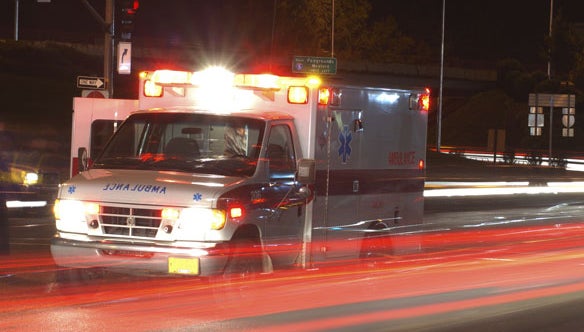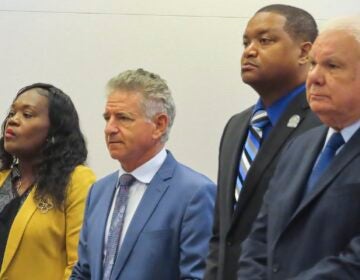As Cooper-backed EMS bill passes, Virtua mulls its legal options

Cooper's takeover of Camden's paramedic services happened very fast. (Stock image)
Cooper University Health Care’s success in bypassing the state’s Certificate of Need process for allocating the City of Camden paramedic services has representatives of hospitals across the state questioning its implications for the future of other hospital services.
In the Certificate of Need process, the state Department of Health solicits public comment to determine whether to make major changes, such as approving the opening or closing of hospitals, the transfer of hospital ownership, or the addition or subtraction of hospital services.
But this process can take years to complete and it may have been a long shot for Cooper to take over Camden’s emergency medical services through the traditional path.
After Gov. Chris Christie signed a law effectively making Cooper the provider of both paramedic and ambulance services in the city, all eyes turned to Cooper rival Virtua Health System to see if it would file a legal challenge.
As Virtua officials mull their options, it helps to understand the steps that the newly enacted law bypasses, known as the Certificate of Need process.
The law doesn’t just rearrange emergency medical services in Camden — it’s one of the biggest challenges ever to the four-decade-old system for allocating healthcare services across the state.
The lightning speed with which the legislation, S-2980/A-4526, was introduced, passed, and signed has widely been seen as a demonstration of the power of Cooper Chairman George Norcross.
It has also prompted a fierce and public response from Virtua President and CEO Richard P. Miller, who said after Christie signed the bill on Monday that the system is “exploring all options, including the possibility of litigation.” His system has provided paramedic services throughout Camden County for 38 years. The ambulance transport services were separately provided by Newark-based University Hospital.
The Senate approved the bill 28-11, while the Assembly voted 58-16. Opponents included Sen. Joseph F. Vitale (D-Middlesex), who said it’s “dangerous health policy” to circumvent the CN process.
The law provides that hospitals that have the highest level of trauma centers – Cooper, Robert Wood Johnson University Hospital in New Brunswick, and University Hospital in Newark – will provide paramedic services (also known as advanced life support, or ALS) in their municipalities.
In addition, the law gives Cooper the right to provide other ambulance services, known as basic life support (BLS).
Currently, the state determines the ALS provider, while each municipal government picks its BLS provider. It also allows hospitals that are part of the same systems as these trauma centers to receive an expedited review of applications to provide ALS in their towns. This provision would allow Robert Wood Johnson University Hospital in Hamilton to displace Capital Health System as the ALS provider in Hamilton. Capital also has provided these services throughout Mercer County for decades.
The Certificate of Need process is used to determine whether proposed changes to significant services provided by hospitals and other facilities licensed by the state Department of Health can occur.
It’s been used in the state since the 1971, and its importance nationally grew following a 1974 federal law designed to ensure that the large amount of federal funding for health care buildings was being spent wisely, improving access to care, and not unnecessarily driving up the cost of care.
The Certificate of Need process is triggered automatically when a hospital seeks to open or close; when a change in hospital ownership is sought, and when hospital officials want to add or drop services.
The NJ Department of Health also issues a Certificate of Need “call” for different health care services when it determines that there is a need, either by finding that there’s an unmet need on its own, or by receiving an application (such as from a provider or a community group) petitioning for services and state officials agree that there’s a documented need.
While the CN process differs depending on the details of the application, the state typically seeks a response from hospitals if a hospital plans to change its services.
It also holds public hearings, gathers pubic input, and uses its professional staff to review the application before a CN is issued or changed by the commissioner of the Department of Health. The whole process can take anywhere from six months to several years.
Supporters of the CN process note that it is public and deliberative , allowing multiple points of view to influence the commissioner’s ultimate decision.
But opponents have said that it serves as a barrier to competition and can lead to some hospitals engaging in monopolistic behavior.
The New Jersey Hospital Association has traditionally supported the CN process, with its representatives saying that while the process isn’t perfect, the state must have a defined process to appropriately allocate resources and services, and to ensure healthcare quality and access. The NJHA sent a memo expressing concern to legislators and Christie before the Legislature passed the emergency medical service bill.
“The legislation marks a significant departure from past practice involving an existing regulatory review process and could have broader, unintended consequences statewide if it is not subject to a more through review of potential impacts,” the board said in the memo, adding that it wasn’t commenting on the merits of any specific EMS provider.
Cooper representative Christine Stearns told the Senate Health, Human Services, and Senior Citizens Committee last month that Cooper’s support for the legislation arose after executives with current Camden BLS provider University Hospital indicated that they no longer wanted to provide ambulance service in the city.
Newark-based University Hospital had provided the service as a legacy from its history as part of the statewide University of Medicine and Dentistry of New Jersey, which it was separated from when most of UMDNJ merged with Rutgers.
Facing the prospect of an extended CN review that could prove unsuccessful, Cooper executives opted to push for the law. Cooper representatives have also pointed to research citing potential benefits from having a single provider for both BLS and ALS services.
For example, the American College of Surgeons noted in a 2008 report for the state that there are additional costs from having separate ALS and BLS providers, since separate vehicles must be dispatched for every call that requires higher-level paramedic services.
Stearns also said the bill would allow Cooper to better “leverage” EMS resources, particularly by encouraging paramedics to make follow-up visits to patients after they’ve been released from the hospital and by aligning ambulances and paramedics more closely with the region’s top trauma center.
___________________________________________________________
NJ Spotlight, an independent online news service on issues critical to New Jersey, makes its in-depth reporting available to NewsWorks.
WHYY is your source for fact-based, in-depth journalism and information. As a nonprofit organization, we rely on financial support from readers like you. Please give today.




